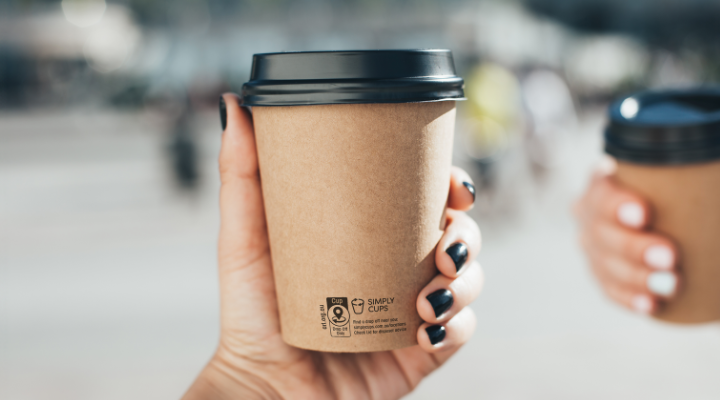An innovative product stewardship initiative is seeing single-use paper coffee, ice-cream and takeaway cups repurposed into asphalt and construction materials, saving millions of cups from landfills every year.
Simply Cups is a product stewardship program created by the 20-year-old Australian sustainability venture Closed Loop that provides circular economy solutions developed in conjunction with researchers, industry and government.
Simply Cups is a recognised Alternative Destination under the Australasian Recycling Label (ARL), a program managed by the Australian Packaging Covenant Organisation (Apco). This allows food service, retail brands and other industries that produce or use paper cups to participate in the product stewardship program.
The program has a network of 1500 collection locations Australia-wide, easily accessible to more than 70 per cent of Australians. These include more than 700 7-Eleven stores, 350 schools and hundreds more at shopping centres, office buildings, events and cafes.
The Drop Off Only ARL is an on-pack label that provides accurate information on how to recycle paper cups. 7-Eleven coffee cups will be the first product on the market with this label. Other paper cups supplied by the national brand will also wear the Drop Off Only ARL to roll out over the next few months.
“There are lots of paper cups available in the environment. But we are not able to collect them right now … there isn’t enough communication: people just don’t know what to do with them.” Adding a Drop Off Only ARL is a solution to this challenge.

As Rob Pascoe, MD at Closed Loop explains, the business is not a recycling company as such. “We are a coordinator of circular economy and product stewardship solutions. We ensure that products can not just be recycled but turned into the highest value-added products possible.”
“We try to give companies a holistic solution for waste that isn’t currently being collected. We then work with various technologies to come up with solutions for repurposing it.”
When it comes to cups, Pascoe says the ideal solution is for consumers to use their own reusable cups. But the reality is that reusable cups are not always practical in our highly mobile lifestyle.
In an era where there is a growing expectation from consumers that companies adopt sustainable practises throughout their businesses, brands need to demonstrate they care about what happens to packaging or single-use products after their use – and that includes considering the design and accurate labelling of recyclable products.
He believes Simply Cups is a great strategy for a brand because it ensures customers can return the used cups to be recycled into something useful.
Cost transparency
The Simply Cups program provides transparency as to where and how cups are being collected, processed and recycled – and also about the cost. Businesses and brands that support the program know their investment is being spent in the following areas.
- Research and development: 25 per cent.
- Collecting cups from businesses and communities, and expanding collection locations: 30 per cent.
- Manufacturing – using successful innovation to recycle paper cups: 30 per cent.
- Government and policy engagement to offer insights and direction for sustainable paper cup outcomes: 5 per cent.
- Marketing and operations: 10 per cent.
From cups to paving
At Simply Cups, collected paper cups are processed in different ways, depending on the end product. One key current solution for paper cups is to become a beneficial additive in asphalt.
Paving of roads in Western Sydney already features recycled cups collected from Simply Cups.
Another use for Simply Cups’ recycled material is as a component in lightweight concrete and concrete blocks.
The lifecycle of a cup
Pascoe advises brands to prioritise considering the end purpose of a cup after its first use – from design through to communicating effectively with consumers about how to recycle or dispose of it.
Pascoe reminds companies that by applying the Drop Off Only ARL to their cups, they can not only communicate their commitment to sustainability but help achieve Australia’s 2025 National Packaging Targets – 100 per cent reusable, recyclable or compostable – and have a competitive edge within the food and beverage industry they serve.
- For more information about the Drop Off Only ARLtake a look at Simply Cups’ website here.
The post How creating recycling partnerships can strengthen the circular economy appeared first on Inside FMCG.


